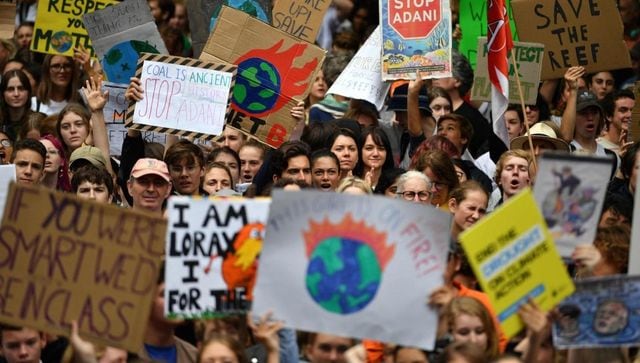
Australian climate protester Deanna ‘Violet’ Coco has been sentenced to 15 months in jail for blocking a single lane of traffic on the Sydney Harbour Bridge in April. Her sentencing has caused a furore among climate change activists and has been condemned by human rights advocates
In a move that has caused much furore, climate protester Deanna ‘Violet’ Coco has been sentenced to 15 months in prison for blocking traffic on Australia’s Sydney Harbour Bridge.
Coco had obstructed a lane of traffic on the bridge in April for 28 minutes, to spread climate change awareness.
Last week, an Australian judge sent her to prison after she pleaded guilty to several charges.
The order has been widely criticised, especially by human rights advocates, who called it “incredibly alarming”, reported The Guardian.
Earlier this year, the New South Wales (NSW) government had tightened laws relating to “disruptive” climate protests, which now include up to a $22,000 fine and two years in prison.
What happened during the climate protests in April that landed Violet Coco in jail? What have the reactions been to the sentencing? Let’s take a look.
Violet Coco and the April climate protest
Violet Coco, 32, is a part of the activist group Fireproof Australia.
She was among the group of four protesters who drove a truck and blocked the city-bound lane during peak-hour traffic on the bridge on 13 April.
Coco had climbed on the roof of the hired van and started a flare. She had reportedly resisted arrest when the police arrived.
The sentencing
The climate activist pleaded guilty to seven offences such as “obstructing traffic, resisting arrest and setting off a distress signal”, reported The Guardian.
As per SBS News, she was fined $2500 for lighting the flare while standing on the truck.
Announcing her sentence, magistrate Allison Hawkins said Coco made an “entire city suffer” with her “selfish emotional actions”.
Coco’s lawyer argued that her emotions were heightened due to her anxiety about the Australian government’s “inaction” on climate change, said Crickey magazine.
To this, Hawkins replied, “You are not a political prisoner, you are a criminal”, reported News.com.au.
As per Independent, court documents say the protest had stopped a New South Wales ambulance from reaching an emergency situation.
“The actions today have not only caused serious disruption to peak-hour traffic, but this imposition to traffic prevented an ambulance responding to an emergency under lights and sirens as it was unable to navigate through the increased heavy traffic as previously mentioned,” the documents said, according to ABC News.

Coco was also denied bail at Sydney’s Downing Centre Local Court and is likely to remain in custody till March when her appeal hearing will take place, Independent reported.
Her lawyer, Mark Davis, has said he will challenge the “extraordinarily harsh” and “baseless” sentencing, as per BBC.
Davis told BBC, “There are five lanes on that bridge. She blocked one, and not for very long”.
“This is almost without precedent”, he said on her sentencing.
As per News.com.au, her bail application hearing at a District Court is slated for 13 December, while the sentence appeal is due in March next year.
Reactions to Coco’s sentence
Many protests were organised following Coco’s sentencing. Climate protesters and her supporters marched in Sydney, Canberra, Perth, Brisbane and Hobart on Monday (5 December).
Coco’s supporters have also launched a crowd-funding campaign for her appeal, which has raised over $37,000 so far, as per News.com.au.
Reacting to the court judgement, Human Rights Watch researcher Sophie McNeill said that Coco’s case sends a terrible message globally.
“We’re always calling on these authoritarian governments to treat peaceful protesters respectfully and to not jail them… [but] a country like Australia – who should be leading on human rights in the region, as a democracy – is also jailing peaceful activists,” she was quoted as saying by BBC.
Luke McNamara, a professor at the University of New South Wales, told SBS News that he believes disruption and protest go together to bring a “tangible change”.
“There’s an inherent contradiction in governments telling protesters what are acceptable, passive, non-disruptive means of engaging in protests, when the evidence may well be that those methods have been attempted and have proven to be ineffective,” he stated.
“We need to recognise that disruption and protest go hand in hand … it’s not realistic to, on the one hand, support the so-called ‘right to protest’, and on the other hand, expect the protest has no disruptive effects. … the two go together”, McNamara said, as per SBS News.
United Nations’s special rapporteur on peaceful assembly Clément Voule said peaceful protesters should “never be criminalised or imprisoned”, reported BBC.
However, not everyone agrees.
The NSW state government has said it is “on the side of climate change action”, adding it could not allow “a handful of anarchist protesters” to “bring this city to a halt”, as per BBC report.
Alister Henskens, Coco’s uncle and a minister in the state government, also hailed the order, saying “nobody is above the law”, the report added.
NSW premier Dominic Perrottet said that “if protesters want to put our way of life at risk they should have the book thrown at them and that’s pleasing to see”, reported Crickey.
